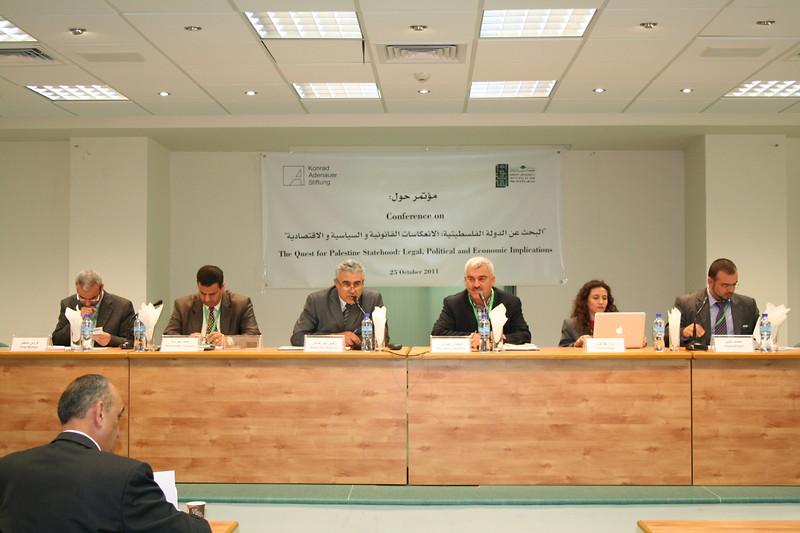The Quest for Palestine Statehood: Legal, Political and Economic Implications - Foundation Office Palestinian Territories
Event Reports
Brief opening speeches were held by the director of the IoL, Ghassan Faramand, the director of the Office of Grants and Contracts at Birzeit University, Munir Qazaz, the Minister of Justice, Ali Khashan and the head of the KAS-office Ramallah, Felix Dane. The priority and importance of the matters that were to be discussed was within the general consensus, not only in legal terms but also from a political and a historical point of view.
The conference was divided into three panels.
The first panel examined Palestine statehood from a political and legal angle shedding light on international law from the perspective of international organizations and the value and nature of diplomatic recognition of emerging states. Furthermore it discussed the role of UN agencies and international courts in supporting the recognition of Palestine statehood as well as legal and political foundations. Among the speakers were Reem Al-Butmeh, research assistant and Assistant Editor of the Palestine Yearbook of International Law at the IoL, Valentina Azarov, a legal researcher with AL-HAQ, a Ramallah-based Palestinian human rights organization, Joni Asi, Assistant Professor at the Political Science Department of Birzeit University and last and foremost John Quigley, Professor of Law at the Ohio State University, USA, specialist on international law and consultant on legal issues in Israel-Palestine peace negotiations since 1992. Salient to this panel was Quigley’s historical approach to the quest of Palestine statehood. Quigley argued that historical evidence proves that Palestine has in fact already been a state for quite a while, more specifically since it was detached from the Ottoman Empire and established under the British Mandate. Therefore the question is not whether Palestine is a state or not or how to create the state but how to implement existing resolutions and reassert statehood in order to ensure long-persuaded international recognition. The panel was closed by a commentary of Yaser Amouri, currently Professor of Public International Law at Birzeit University.
The second panel discussed statehood-related aspects under constitutional law, constitutional value, legal and ideological components and constitutionalism in theory as well as in the face of building and sustaining a constitutional democracy in Palestine. Speakers were Asem Kahlil, Assistant Professor of Law at Birzeit University, Yara Jalajel, Ph.D. candidate in Public Law at the University of Paris I-Sorbonne, Ahmad Abu Dayyeh, Director General of Parliamentary Committees at the Palestinian Legislative Council and lecturer at the Political Science Department of Birzeit University and Sha’wan Jabareen, General Director of Al-HAQ. According to Jabareen it is a known fact that some of the most despotic regimes yet have the most beautiful constitutions. They simply fail to apply. Therefore it is vital to link the constitutional issue to the three basic values of human rights: dignity, freedom and equality. Jabareen underlined that any law is empty as long as no one participates, which is why it is crucial to raise awareness among the people that within the human rights they have adherent rights that nobody under any circumstances can deny them. Firas Milhem, lecturer on Constitutional Law at Birzeit University, summarized the discussion pointing out that the Palestinians do in fact already hold an advanced basic right in comparison to other Middle Eastern countries, if not to say the best. Nevertheless it is mandatory to put the occupation to an end before drafting a constitution for the Palestinian people.
The final panel tackled essential economic considerations of a viable statehood and gave an overview on the future of the state of Palestine from a macroeconomic perspective. The first speaker Mehrene Larudee, who currently leads the Economics/Finance program at Al Quds/Bard Honors College, discussed economic independence and resilience of small countries such as Palestine. According to Larudee the main dangers for Palestine are its country and energy import dependencies. She suggested import substitution and a diversification of trade in order to contain the problem. Naser Abdelkarim, second speaker and local consultant to international organizations, discussed the role of external aid. Abdelkarim pointed out that while financial assistance may be large, its efficiency frighteningly low. He holds the Israeli colonialism accountable for the lack of economic growth and claims that economic resources cannot be used efficiently as long as occupation continues. The third and final speaker Yaser Shaheen, director of the Administrative and Financial Sciences Department and Human Resources Development Center at Palestine Ahliya University spoke about tax and customs management within a framework of appropriate Palestinian monetary measures. This final panel was resumed rather harshly by Mohammad Nasr, Dean of the Commerce and Economics Faculty at Birzeit University. Nasr undermined large parts of the contributions to this conference. He argued that Palestine’s current status quo and the past failure of implementing the Paris Protocol, which is now, however, no longer valid in its initial form, render many of the proposed theoretical approaches impossible. It is essential to grant Palestine an independent state as well as an independent economy in order to develop independent solutions for the incomparably unique case of Palestine statehood and its current and future challenges.







